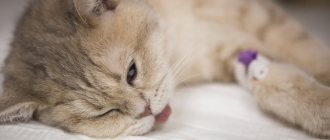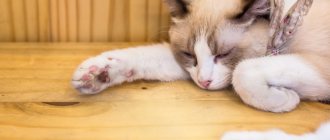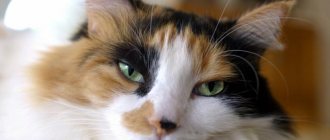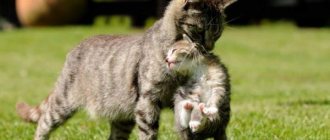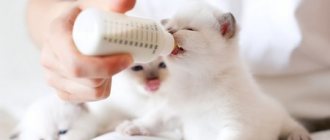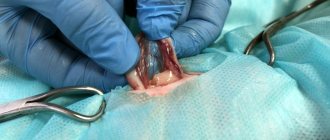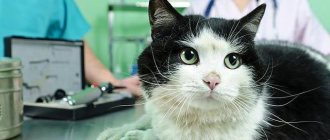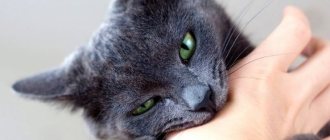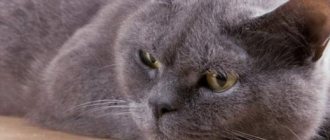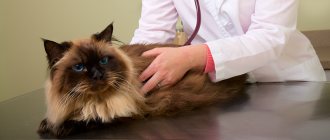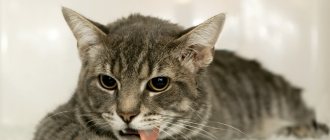Home » Useful Information
As a rule, if a kitten has a bloated belly, this is rarely a cause for concern among owners. On the contrary, many people believe that a big belly is the norm after a heavy lunch or dinner. Unfortunately, this does not always happen, and in some cases, a kitten’s bloated belly is a sign of serious and sometimes dangerous pathologies.
- 2 How to determine the cause of a bloated belly
- 3 What to do if the kitten has a big belly
3.1 Video: the kitten has a large and hard belly - what to do
- 5.1 Video: first feeding of kittens
Causes of abdominal enlargement in kittens
Normally, a kitten’s tummy should be of moderate size: a little larger after eating, a little smaller after visiting the litter box. At the same time, it should be soft. An inflated, elastic tummy (like a balloon) should alert the owner.
There are quite a few reasons why kittens have an enlarged abdomen. The most common of them:
- Poor nutrition. The diet of kittens should be different from what adult cats eat. This applies to both homemade food and special cat food. It is ideal if the kitten feeds on mother’s milk, but after one month of age, babies begin to show interest in adult food. But at first they need soft, perhaps semi-liquid food. Rough food causes tummy problems in young kittens, most often resulting in increased gas and bloating.
- Binge eating. Errors in nutrition can be associated not only with the nature of the diet, but also with the volume and frequency of food intake. Large portions simply stretch the kitten's stomach, which is why its tummy begins to bulge noticeably. Overeating is dangerous because over time the kitten may develop obesity, which provokes various diseases of the internal organs.
- Constipation. The consequence of eating rough food not intended for small kittens, as well as overeating, is the development of constipation, in which the pet cannot empty its intestines. This causes the abdomen to swell, become hard and painful.
- Helminthic infestations. The presence of worms in kittens is a common problem. However, some owners may not understand how their newly born babies got parasites. They can be infected with worms by the mother or other animals in the house who have contact with the kittens and spend a lot of time outside.
A kitten can become infected with worms from its mother with her milk, and she, in turn, could get helminths from fleas or mice
- Internal pathologies. Serious pathologies such as peritonitis, cirrhosis, and inflammation of the bladder can be accompanied by ascites (abdominal edema, a condition in which fluid accumulates in the abdominal cavity). It is worth noting that abdominal enlargement is only an uncharacteristic symptom.
I adopted my Thai cat from friends as a 1.5-month-old kitten. Her mother was a completely domestic cat, the kittens were clean and flea-free. I couldn’t even think that my pet could have worms. And a big belly, as it seemed to me then, happens to all kittens. But very soon, while cleaning the tray, I noticed these parasites (alive, I must say) in the excrement. I was shocked. Naturally, I immediately bought pills and wormed the kitten. Since then I have been suspicious of kittens with big bellies.
We guarantee treatment of cancer in cats at home!
Our home help will:
Operational – “Animal Doctor” works around the clock, call us at any time.
Professional – we are equipped with equipment for full diagnostics and effective treatment.
Comprehensive - we will not only conduct an examination to determine the main signs of oncology in cats, but also offer therapy at home, including surgical removal of the tumor!
What are the most common types of cancer in cats?
Pets can suffer from different types of cancer. This is first of all:
- mammary cancer in a cat;
- intestinal tumors;
- abdominal tumors;
- skin lesions;
- joints and bones;
- cat brain cancer.
Don't take your cat to the clinic, we will come to you ourselves!
Cat cancer: we treat it in comfortable conditions!
Signs of cancer in cats are similar, regardless of the location of the tumor. Among them are:
- loss of appetite and sudden weight loss;
- disheveled, dull, brittle fur;
- depression, apathy;
- the presence of non-healing wounds;
- swelling;
- bleeding;
- breathing problems;
- unpleasant odor coming from the cat.
There are also other symptoms, and as soon as you notice something alarming, it is better to immediately invite a veterinarian!
“Animal Doctor” will offer you treatment for cancer in cats at home, which will allow your pet to undergo even the most complex procedures in a familiar environment. Chemotherapy, some types of surgery, and immunotherapy can be performed at home, and your pet will be able to get better without needing to travel to the clinic. Get stress-free treatment and let feline cancer never be a threat to your pet!
If your cat's sides are swollen, you need to immediately find out the reason for this and select a treatment regimen as quickly as possible. The simplest explanation is the accumulation of gases in the intestines, however, in order not to miss more serious problems, you need to learn to recognize dangerous symptoms.
How to determine the cause of a bloated belly
In most cases, an increase in the size of a kitten's belly is not a sign of serious pathologies. You can try to determine the cause of a bloated belly yourself:
- When the problem is related to errors in nutrition, namely overeating or feeding age-inappropriate food, the kitten experiences bloating. This occurs due to pressure on the walls of the intestines and peritoneum of gases that were formed due to malfunctions in the baby’s digestive system. In other words, the kitten is worried about flatulence. It's very easy to check - just lightly tap your stomach with your fingertips. If at the same time a dull sound occurs (as if from a “barrel”), then this indicates flatulence. You can also often feel and hear a rumbling sound when you put your hand on the kitten’s tummy.
Most often, a kitten's bloated belly is caused by errors in nutrition.
- With constipation, you can note that the kitten does not go to the toilet for a long time to empty its intestines (more than a day), meows pitifully and is worried.
- Worm infestations accompanying a pet's swollen tummy cannot be determined without an appropriate analysis performed by a veterinarian (except for cases where worms are visible to the naked eye in the animal's excrement, which indicates a massive infection). Therefore, in cases where the kitten’s nutrition is organized at the proper level and there is no reason to believe that flatulence is the cause of the illness, the animal should be shown to a veterinarian.
- Internal diseases, which, among other things, lead to bloating in kittens, have a whole range of other symptoms by which they can be diagnosed. However, this should be done by a professional - a veterinarian.
Bloating in kittens is often accompanied by the following conditions:
- diarrhea - observed with poor nutrition and helminth infection;
- vomiting - one-time can be associated with overeating, repeated - with a wide range of diseases of the digestive tract, including helminthic infestations;
- unpleasant color and smell of feces - may indicate infectious diseases or helminthic infestations;
- changes in taste preferences and feeding habits - eating inedible objects, an unusually strong appetite may indicate that the kitten is not getting the vitamins and microelements it needs from food;
- elevated body temperature, lethargy, apathy - as a rule, indicate food toxic infections or inflammatory diseases of internal organs, for example, peritonitis.
What to do to eliminate the pathology?
If the kitten's sides are swollen due to a severe internal illness, the doctor will hospitalize the pet and, if necessary, perform surgery. In other cases, you can deal with the problem at home. For constipation, you can give your pet the drug Duphalac and use microenemas. Vaseline oil will help improve digestion; its dosage is 0.1 ml per 100 g of weight. It is recommended to give the product 2-3 times a day.
If the cat's swollen sides are a sign of helminthic infestation, in this situation antihelminthics will help normalize the condition. Doctors at the Zoovet clinic point out that not every drug is intended for kittens aged 2-3 months. Therefore, the veterinarian must select the medicine, taking into account the baby’s age, the degree of invasion and other individual characteristics.
After giving birth, the cat's abdomen will return to its normal position without special treatment. The problem of overeating is easy to eliminate. Often, increased appetite is associated with a lack of vitamins and other elements in the body. Therefore, it is better to feed your cat with ready-made food, where all the ingredients are balanced and selected for a certain age.
In what cases should you contact a veterinarian?
The most dangerous causes of an enlarged abdomen in a kitten are peritonitis and ascites. Without timely veterinary care, the pet may even die. How to recognize these dangerous pathologies:
- Peritonitis is an inflammation of the abdominal cavity of an animal. It is necessarily accompanied by the following symptoms: elevated body temperature;
- vomiting;
- refusal of food;
- weakness;
- apathy.
Peritonitis and ascites are life-threatening conditions, so you need to take the kitten to the vet as soon as possible. Only a specialist can treat these pathologies, and sometimes even minutes count.
Other reasons
Among other diseases and conditions that may cause a cat to have a very hard belly are:
- peritonitis;
- abdominal abscess;
- abdominal injuries;
- ascites.
Peritonitis is characterized by inflammation of the abdominal mucosa. The disease is accompanied by suppuration and pain, which leads to a reflex contraction of the abdominal muscles.
Abdominal injuries in cats have no visible manifestations. The animal may hit itself when jumping, which is manifested by an increase in the tone of the abdominal muscles. A dangerous condition is injuries with internal bleeding. Pathology can be suspected only by the presence of blood in the stool and frequent urination. If internal bleeding is suspected, the animal should be transported to a veterinary clinic as soon as possible.
Ascites or abdominal dropsy is an increase in the size of the abdomen due to the accumulation of large amounts of fluid. The disease is treated only in a hospital setting, since it is necessary to install a drainage channel to remove fluid.
Nutrition
A kitten may have a hard belly for the following reasons.
- Binge eating. Kids love to eat “tightly”, sometimes they are not able to calculate their strength. In this case, digestion slows down, food does not move well through the gastrointestinal tract due to excessive stretching of the walls of the stomach and intestines. Regular overeating should not be allowed, as this will cause digestive problems in the future - diseases of the stomach, liver, and pancreas. Make sure that the amount of food your kitten consumes is appropriate for its age and weight. What to do if the kitten refuses to eat - read the material Why the kitten does not eat or drink.
- If your kitten has a large, hard belly, this may be a sign of gas buildup in the intestines. The baby's abdomen is greatly increased in volume, the kitten experiences discomfort, and when lightly tapping the abdominal wall with a finger, a “drumming” sound can be heard. Gases accumulate when eating poor-quality food, fermented products (such as bread), or poor bowel movements.
- Constipation. Solid food, wool, and foreign objects cause difficulty in the passage of feces through the intestines, and the abdomen increases in volume. Sometimes it is possible to palpate dense conglomerates through the abdominal wall. Defecation is difficult or completely absent.
To normalize stool, exclude solid food from the kitten's diet. Give milk, a little yogurt, sour cream, liquid minced meat or fish, chicken egg yolk.
In cases with gases, you can alleviate the animal’s condition by giving it a quarter of a tablet of activated carbon, which must be crushed and diluted with water. Sometimes a gentle massage of the abdomen with a warm hand and insertion of a gas outlet funnel into the anus helps. To make defecation easier, you can do a warm water enema. If there is a suspicion of intestinal obstruction (severely bloated abdomen, pain, complete absence of stool), urgently take the baby to the veterinarian.
The kitten has a fat belly Moscow
Conjunctivitis of newborn kittens (ophthalmia neonatorum)
Kittens' eyelids do not open until they are 10-12 days old. The closed space behind the eyelids can become infected if bacteria enters it through the bloodstream or through small scratches near the eye. The eyelids are red and swollen. If the eye is slightly opened, discharge and crusts may appear. Regardless of the nature of the discharge, this phenomenon is abnormal. Feline herpesvirus can cause neonatal infectious conjunctivitis. The virus is transmitted to fetuses in utero or shortly after the kittens are born.
Neonatal conjunctivitis usually occurs in several kittens in a litter. In this case, the eyelids should be opened slightly to allow the pus to escape. Otherwise, constant inflammation of the anterior part of the eye will occur. As soon as the eyelids separate, the pus is released in large drops. In this case, the eyes are washed with a 2% solution of boric acid, after which drops with antibiotics (neomycin, gentamicin) are administered 4 times a day. The eyelids should be washed several times a day to prevent them from sticking together again.
Principles of disease treatment
The first thing you can do at home is to palpate the abdomen and find out whether it causes discomfort in the animal. In case of serious pathologies, the cat will be in pain. If the pet does not resist examination, begin treatment at home.
- Deworming. Treatment against parasites must be carried out every three months.
- Nutrition adjustments. Diet and balanced food will help prevent bloating. Among medications, you can use Smecta or children's Espumisan, but only after consulting a veterinarian.
- If a cat shows signs of obesity and this causes swollen sides, then a diet and increased physical activity are indicated. It happens that the cause of weight gain is problems with the thyroid gland. In this case, the cat must be shown to a specialist who will select hormone-containing therapy.
- If the stomach and sides are swollen, and you do not notice the accumulation of gases and the cat is not constipated, it is possible that fur has accumulated in the pet’s stomach. In this case, you can give a special hair removal paste.
If the measures taken do not help, only a doctor can carry out treatment.
- At the hospital, the cat will undergo tests and an ultrasound of the abdominal cavity.
- In case of ascites, it is necessary to drain (remove) fluid from the abdominal cavity, which will determine the cause of the dropsy. A diet (reducing salt intake) and taking heart medications are mandatory, since the accumulation of excess fluid in the body increases the load on the heart muscle.
- If the sides are swollen as a result of a malfunction of the genitourinary system, then diuretics will be prescribed.
- Surgery is a last resort method used when a cat develops neoplasms.
- In mild cases, pyometra is treated with medication by selecting hormonal therapy, taking antibiotics and antispasmodics. If there is a large accumulation of pus in the uterus, surgery is performed.
